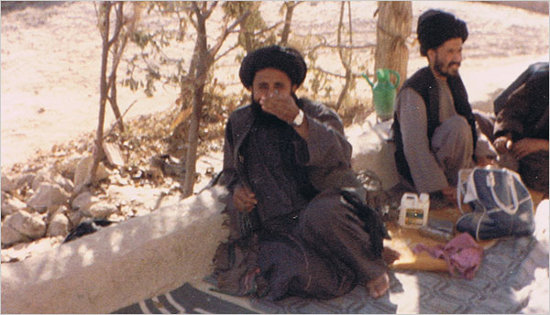center>
 |
| An old photograph of Mullah Abdul Ghani Baradar, the former leader of the Quetta Shura who was detained in Karachi. Image from The New York Times. |
Pakistan is planning on freeing Mullah Abdul Ghani Baradar, the Afghan Taliban's second in command before he was detained in Karachi in 2010, an adviser to Prime Minister Nawaz Sharif said. But Baradar will be released in Pakistan and will not be handed over to Afghan officials.
"In principle, we have agreed to release him. The timing is being discussed. It should be very soon ... I think within this month," Sartaj Aziz, Sharif's advisor on foreign affairs told Reuters.
Although the reason for Baradar's planned release has not been disclosed, Sharif's government has been attempting to negotiate a peace agreement with the Movement of the Taliban in Pakistan, which has sworn allegiance to Mullah Omar and the Afghan Taliban. The Movement of the Taliban in Pakistan has demanded the release of Baradar and other Afghan Taliban leaders, such as Mullah Mansoor Dadullah, who was captured in 2008 and released last week.
Sharif has also been making a push for the Pakistani government to be seen as facilitating peace talks in Afghanistan. Some Afghan officials have sought the release of Baradar and believe he can facilitate peace talks with the Taliban. Baradar is often portrayed as representing the "moderate" wing of the Taliban, and as potentially being instrumental in brokering peace talks with his faction. Also, the hope is that Baradar will be able to engineer the much-sought-after split between the Taliban and al Qaeda, thus allowing a US withdrawal.
But despite years in which US and NATO officials have been pinning their hopes on the rise of a moderate wing of the Taliban, no such group has come to the forefront. In fact, the Taliban have demonstrated, through their tactics and the appointment of leaders, that they have become more radical, not less, over time. And the Taliban have refused to denounce al Qaeda.
Baradar's replacement, Mullah Zakir, a former Gitmo detainee, is closely allied to al Qaeda, and he has promoted commanders who see eye to eye with him. Additionally, as of 2012, three of the four leaders of the Taliban's regional military councils -- Zakir, Siraj Haqqani, and Sheikh Mohammed Aminullah -- are closely allied with al Qaeda.
Before his capture in a joint CIA and Pakistani military raid in the port city of Karachi in February 2010, Baradar served as the Afghan Taliban's operational commander and the top deputy to and close confidant of Mullah Mohammad Omar, the spiritual leader of the group.
Baradar was one of the founders of the Afghan Taliban. He was said to direct the Taliban's Shura Majlis, or top leadership council. Baradar directed the Taliban's day-to-day operations, and was in close contact with regional military commanders and the shadow governors, the Taliban's political and military leaders in the provinces. He also was said to control the Taliban's purse strings.
While the Pakistani government may be touting the release of Baradar as part of its efforts to promote peace in Afghanistan, the move may be part of the military and intelligence establishment's efforts to bolster the Taliban's leadership cadre. The Inter-Services Intelligence Directorate, Pakistan's notorious military intelligence service, has long supported the Taliban, and has allowed their leadership councils to operate unfettered in the country.
The release of Baradar inside Pakistan also runs the risk that he may return to the Taliban and rejoin the fight against the Afghan government and Coalition forces. Afghan officials have had difficulty tracking Taliban leaders once they have been released by Pakistan. Numerous Taliban commanders and fighters, including Zakir, have rejoined the fight after being released in Pakistan and Afghanistan.